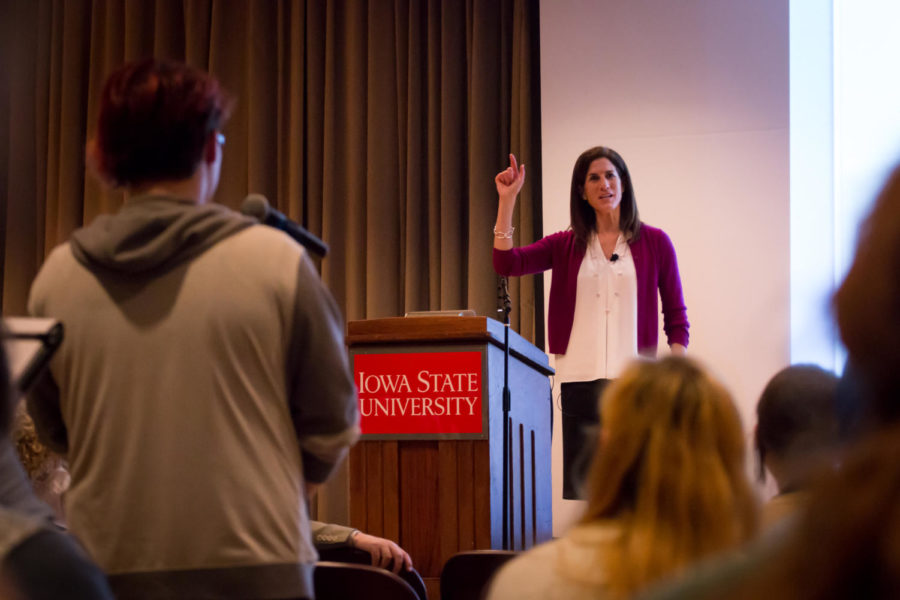Guest lecturer explains impact of politically correct speech
Alec Giljohann/Iowa State Daily
Anne Curzan, Associate Dean for Humanities at the University of Michigan, responds to questions at the ‘Politically Correct; Do our Language Choices Matter?’ lecture where she discussed to what extent social attitudes shape language or if language has the power to change social attitudes.
April 13, 2017
There is no such thing as “just language.”
Anne Curzan, associate dean of humanities and Arthur F. Thurnau professor of English at the University of Michigan, uses her knowledge of linguistics to discuss the social power language holds. Curzan is the author of “Gender Shifts in the History of English” and is the subject of a 36-lecture series titled “The Secret Life of Words.”
In Curzan’s lecture, “Politically Correct: Do Our Language Choices Matter?,” she discusses everything from sexist language to preferred pronouns in order to dispel the stigma against politically correct speaking.
She spoke to students in the Memorial Union Thursday evening.
“It is never just language,” Curzan said. “As soon as anyone says it’s just language, it’s because they don’t want to deal with the real issue.”
Curzan’s lecture centered around the modern use of politically correct speech and worked to dissect what that truly means: Is politically correct language a violation of freedom of speech or is it a practice of good manners and respect?
There are set attitudes when confronting the topic of PC language, often surrounding negative connotation, Curzan said. Those who use political correct language often experience backlash, as it can be interpreted as being overly sensitive or as a form of sensory that violates a key First Amendment right.
Many view the emphasis of politically correct language as a way to avoid more important issues.
“This is not an either-or situation,” Curzan said. “ It’s very hard to get people to change their language, but changing language does have the power to change attitudes.”
The first half of the lecture focused on modern language and looked at what Curzan called the sexist history of the English language.
Curzan pointed out that it wasn’t until 2009 that Congress recognized that government positions such as the chair head of a committee, formerly referred to as a chairman, should change their titles to encompass all potential candidates.
It is often thought that the suffix “man” is an all-inclusive and general term, but Curzan compared this to using “woman” as a position suffix. For example, “camerawoman” is not viewed as an all-inclusive title.
This is a practice dating back to the 1700s when male superiority was emphasized through saying in congressional documents, “the masculine encompasses the feminine.”
“The English language is sexist; it has a long history of being sexist,” Curzan said. “Language has always been politicized; it always involves a negotiation of power.”
Curzan also touched on the proper use of pronouns. This is a difficult subject for many people to grasp, but Curzan said it holds growing importance in society.
“If someone said to you, ‘Hello, my name is Chris, but I go by Paul,’ you would not say, ‘Well, I am going to call you Henry because that’s easier for me,’” Curzan said. “And the same rule applies to any pronoun someone asks to be referred as.”
The English language has come a long way in the last one hundred years, but work still needs to be done to perpetuate an equal and inclusive society, Curzan said.
















